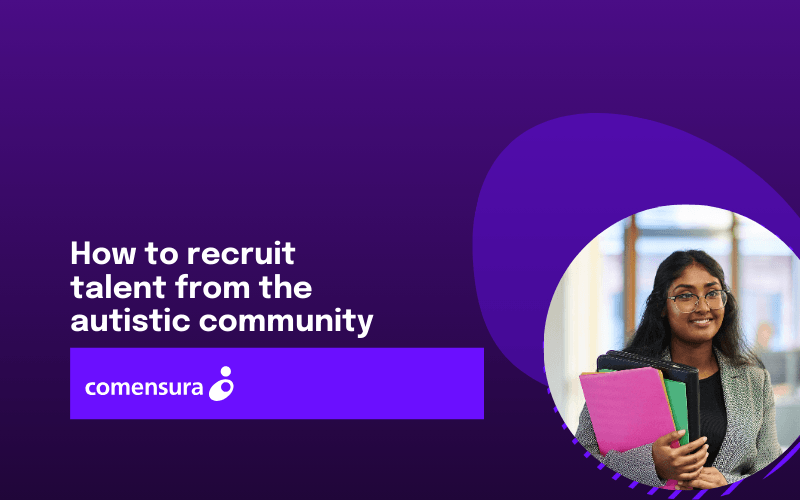

Author
2024-06-21
5 minutes
How to recruit talent from the autistic community
What is neurodiversity and why does it matter?
Neurodiversity is a term used for people that experience and interact with the world around them in many different ways; there is no one "right" way of thinking, learning, and behaving, and differences are not viewed as deficits.
Neurodiversity standardly includes neurological differences, and autism is a common form of neurodiversity. Autism is not a learning disability, which is a misconception often held.
Autistic people, like neurotypical people, all have unique strengths that can contribute to the success of an organisation, if they are valued and supported.
Autism and employment
According to a report by the National Autistic Society, only 16% of autistic adults in the UK are in full-time paid employment, in spite of the fact that 77% would like to work. This is a huge potential loss of talent for employers in the UK, many of whom are facing vast skills shortages.
Neurodiverse people often face discrimination, however a key issue they can face is stigma and stereotype, caused by fictional media portrayal, especially for autism.
Films and programmes such as Rain man, The Good Doctor, and Atypical – whilst probably striving to raise awareness and promote inclusion – portray a stereotypical, extreme picture of a ‘classic autistic person.’
In film and TV, almost all of the neurodiverse characters are straight white men, who are difficult to interact with and are incredibly strong in maths and science. In reality, the autism community ranges in ethnicity, gender, sexual orientation, and/or other characteristics.
Strengths also vary but more importantly, so do interests and career aspirations. Stereotypes such as ‘all autistic people are good with tech’ or ‘a lot of autistic people are maths geniuses’ should be disregarded and autistic people should be individually evaluated on skills, interests, and aspirations, just like neurotypical people.
Autistic people who have achieved great success in areas maybe not traditionally associated with autism include:
-
Anne Hegerty best known as The Governess in quiz show The Chase, who excels in recalling facts and information in an entertainment environment
-
Chris Packam, whose ability to build an encyclopaedic knowledge of the natural world has led to a successful TV career and passionate environmental campaigning
-
Professional rower Caragh McMurtry, who represented Team GB at Tokyo 2020 and is now helping other neurodivergent athletes achieve their dreams
How to recruit neurodiverse talent
Many traditional recruitment practices such as open interviews and psychometric tests can be biased and inaccessible for neurodiverse candidates, who may struggle with social conventions and cues, communication, and abstract reasoning.
To attract and hire neurodiverse talent, employers should consider the following steps:
-
Ensure job descriptions are concise and focused on the essential skills and tasks of the role. Avoid ambiguous language, such as "team player" and “can do attitude” in favour of providing specific examples of what is needed and expected
-
Make the recruitment process transparent and accessible, with clear, detailed information about what the process is, including the various stages, timings, and expectations of the process. Do not make assumptions about what applicants might believe the process would involve
-
Make it clear that you can offer reasonable adjustments for all circumstances including neurodiversity by name, such as extra time, regular breaks, quiet spaces, or assistive technology where needed
-
Train interviewers on neurodiversity awareness and inclusion. Promote an attitude that is respectful and open-minded, avoiding media-based stereotypes and generic assumptions
-
Use structured and competency-based interviews for all applicants – not just autistic applicants – to ensure a level playing field. Focus on the relevant skills and experience of the candidates, with a set of standardised and objective questions, and use a scoring system to evaluate the answers. Find out more about accessible interview questions.
-
Consider providing applicants with the interview questions ahead of time so they can clarify any uncertainty and prepare
-
Seek feedback from current and previous applicants to evaluate your recruitment processes and identify any barriers that neurodiverse candidates may encounter. Look to improve your practices and policies as a result of this feedback
Diversity and inclusivity are not ‘nice to haves’, they are productivity ‘must.’ Inclusive teams make better business decisions up to 87% of the time. Decisions made and executed by diverse teams delivered 60% better results.
Neurodiversity is only one aspect of that however, neurodiversity is a massively underrepresented group in the workplace.
By adopting neurodiverse-friendly recruitment practices, employers can tap into the untapped potential of neurodiverse talent, and benefit from their diverse skills, perspectives, and creativity.
Insights to drive workforce performance
Workforce insights in your inbox
Sign up for our newsletter with the latest workforce management news, insights, analysis and more.
United Kingdom
First Floor, Mulberry House
Parkland Square
750 Capability Green
Luton, LU1 3LU
Australia
Suite 1403
Level 14, 309 Kent Street
Sydney
NSW 2000



